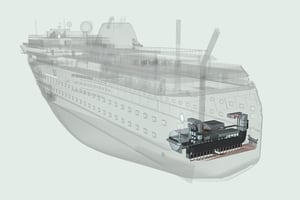Fueling the future of maritime operations

Hydrogen's suitability as a maritime fuel
Hydrogen's potential in maritime applications lies in its environmental and operational advantages. As a zero-emission energy carrier, hydrogen, when produced from renewable sources, offers a pathway to drastically reduce greenhouse gas emissions from ships. This aligns with the EU's climate neutrality goals by 2050 and supports the European Commission's ambition to integrate renewable energy into the energy mix.
The maritime sector, responsible for a significant portion of global CO2 emissions, faces an urgent need for greener alternatives. Hydrogen, with its capacity for high energy efficiency and zero tank-to-wake emissions, is a promising solution to this challenge. Its adoption is essential in meeting the IMO's ambitious target to halve GHG emissions by 2050 compared to 2008 levels.
Hydrogen as a maritime fuel
Hydrogen's properties make it well-suited for maritime use. As a lightweight, colorless, and non-toxic gas, it can be stored as a liquid or compressed gas, offering flexibility in maritime applications. When used in fuel cells, hydrogen achieves high efficiency, converting energy to power with only water as a byproduct, making it an environmentally sound choice for shipping.
However, the transition to hydrogen as a primary maritime fuel presents technical and infrastructural challenges. Compared to traditional marine fuels, hydrogen requires advanced storage solutions due to its low volumetric energy density. This necessitates innovative approaches in ship design and fuel storage to accommodate hydrogen's unique properties.
Despite these challenges, the potential benefits of hydrogen in reducing maritime emissions are substantial. Current developments in hydrogen technology, including fuel cells and dual-fuel internal combustion engines, are paving the way for more widespread adoption in both inland and ocean-going vessels.
Our commitment to hydrogen technology
At HAV Hydrogen, we are dedicated to harnessing hydrogen's potential to advance maritime sustainability. Our involvement in pioneering projects like FreeCO2ast and Retrofit Vestland demonstrates our commitment to integrating hydrogen technology into maritime operations. We collaborate with industry leaders and research institutions to overcome the hurdles of hydrogen adoption, ensuring our solutions are both innovative and practical.
As the maritime industry evolves, we stand at the forefront of this transformation, championing hydrogen as a key component of our vision for a greener maritime future. Our efforts align with global initiatives and regulatory frameworks, contributing to a sustainable shipping industry that is both environmentally responsible and economically viable.


